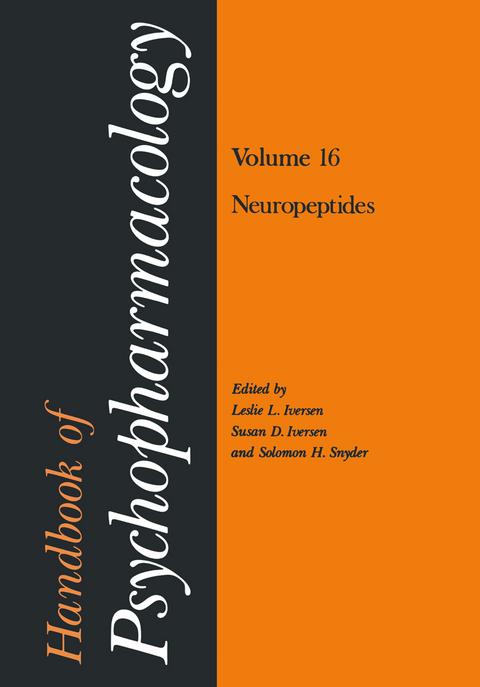
Handbook of Psychopharmacology
Springer-Verlag New York Inc.
978-1-4613-3517-7 (ISBN)
1 Substance P in the Nervous System.- 1. Introduction.- 2. Methods for Detection and Assay of Substance P.- 3. Neurochemistry of Substance P Neurons.- 4. Substance P in the Peripheral Nervous System.- 5. Substance P in Primary Sensory Neurons.- 6. Substance P in the Central Nervous System.- 7. Coexistence of Substance P with Other Neurotransmitters.- 8. Interaction of Substance P with Other Transmitter Receptors.- 9. Neurological Disorders Affecting Substance P Neurons.- 10. Conclusions.- 11. References.- 2 The Enkephalins.- 1. Introduction.- 2. Enkephalin Biosynthesis.- 3. Regulation of Enkephalin Concentration in the Adrenal Medulla.- 4. Enkephalin Metabolism.- 5. Enkephalin Regulation in Neurons.- 6. Enkephalin Distribution.- 7. Electrophysiology of Enkephalin.- 8. Enkephalin Receptors and Cellular Effects.- 9. Enkephalins and Pain.- 10. Role of Enkephalin in the Gastrointestinal System.- 11. References.- 3 Beta-Endorphin and Biosynthetically Related Peptides in the Central Nervous System.- 1. Introduction.- 2. Immunohistochemistry: ß-LPH, ß-END, ACTH, ?-MSH, and Gamma-MSH (?-MSH).- 3. Biosynthesis of the ACTH, ?-MSH, ß-END/?-MSH Precursor.- 4. Receptors of ß-END, ACTH, ?-MSH.- 5. Physiological and Behavioral Studies.- 6. Psychiatric Studies Using Opioid Peptides and Related Pharmacology.- 7. Future Directions: The Multisubstance Neuron.- 8. References.- 4 Cholecystokinin and Vasoactive Intestinal Polypeptide.- 1. Introduction.- 2. Cholecystokinin.- 3. Vasoactive Intestinal Polypeptide.- 4. Conclusion.- 5. References.- 5 Brain Angiotensin.- 1. The Renin-Angiotensin System.- 2. Effects of Angiotensin on the Brain.- 3. The Brain Renin-Angiotensin System.- 4. References.- 6 Neurotensin and Bombesin.- 1. Introduction.- 2. Neurotensin.- 3. Bombesin.- 4.Discussion.- 5. References.- 7 Extrahypothalamic Distribution and Action of Hypothalamic Hormones.- 1. Introduction.- 2. Luteinizing-Hormone-Releasing Hormone (LH-RH).- 3. Thyrotropin-Releasing Hormone (TRH).- 4. Somatostatin.- 5. Corticotropin-Releasing Factor (CRF).- 6. Vasopressin.- 7. Oxytocin.- 8. Concluding Remarks.- 9. References.- 8 Peptide Effects on the Excitability of Single Nerve Cells.- 1. Introduction.- 2. Invertebrate Studies.- 3. Vertebrate Studies.- 4. Conclusion.- 5. References.- 9 Neuronal Coexistence of Peptides with Other Putative Transmitters.- 1. Introduction.- 2. Methodology.- 3. Adrenal Chromaffin Cells and Some Other Paraneurons.- 4. Peripheral Nervous System.- 5. Central Nervous System.- 6. Concluding Remarks.- 7. References.
| Zusatzinfo | 592 p. |
|---|---|
| Verlagsort | New York, NY |
| Sprache | englisch |
| Maße | 170 x 244 mm |
| Themenwelt | Sachbuch/Ratgeber ► Natur / Technik ► Garten |
| Medizin / Pharmazie ► Medizinische Fachgebiete ► Neurologie | |
| Medizin / Pharmazie ► Medizinische Fachgebiete ► Pharmakologie / Pharmakotherapie | |
| Medizin / Pharmazie ► Medizinische Fachgebiete ► Psychiatrie / Psychotherapie | |
| Medizin / Pharmazie ► Medizinische Fachgebiete ► Schmerztherapie | |
| Medizin / Pharmazie ► Pharmazie | |
| ISBN-10 | 1-4613-3517-5 / 1461335175 |
| ISBN-13 | 978-1-4613-3517-7 / 9781461335177 |
| Zustand | Neuware |
| Informationen gemäß Produktsicherheitsverordnung (GPSR) | |
| Haben Sie eine Frage zum Produkt? |
aus dem Bereich


